Seven Impossible Interviews Before Breakfast #60:
A Cyber-Breakfast and Chat with Kimberly Willis Holt
 December 19th, 2007 by jules
December 19th, 2007 by jules
There’s been a significant amount of Kimberly Willis Holt love goin’ on at 7-Imp in our relatively short existence (here she is to the left as a child with her sailor dad). You may have noticed last year that Eisha and I were quite fond of Kimberly’s picture book, Waiting for Gregory (Henry Holt), with the beautiful and eye-popping illustrations of Gabi Swiatkowska. We raved about it here last year in early November. It was one of our top-five favorite picture books of ’06. And then there was Part of Me: Stories of a Louisiana Family (Henry Holt) — another of Kimberly’s titles from ’06, a series of short stories tracing the roots of a Lousiana family over four generations — which I reviewed here. Most recently, I reviewed Kimberly’s latest title, a chapter book entitled Piper Reed: Navy Brat (Henry Holt), the story of a sassy, young girl whose father, a Navy aircraft mechanic, is transferred yet again and her family must move to a new home in Pensacola, Florida. With help from her sisters, whom most days she can do without, and a surprise from their parents, Piper manages to find happiness in her new home.
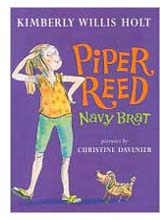 Eisha and I have also read and enjoyed many of Kimberly’s previous, pre-7-Imp titles and are rather giddy that she cyber-stopped by for a chat. Seeing as how she’s one of children’s literature’s reigning queens of Southern fiction (not to mention she’s a self-proclaimed “country girl at heart”), we laid out our best cyber-Southern breakfast spread as good hosts will do — some cyber-biscuits (with gravy, of course); grits; cornbread; and some sweet tea, y’all. And “Roger Miller’s Golden Hits” is on our CD player: He’s crooning “Dang Me” as we chat it up with Kimberly. And since we’re somewhat starstruck, we’ll be on our best manners and hope she’ll enjoy her stay.
Eisha and I have also read and enjoyed many of Kimberly’s previous, pre-7-Imp titles and are rather giddy that she cyber-stopped by for a chat. Seeing as how she’s one of children’s literature’s reigning queens of Southern fiction (not to mention she’s a self-proclaimed “country girl at heart”), we laid out our best cyber-Southern breakfast spread as good hosts will do — some cyber-biscuits (with gravy, of course); grits; cornbread; and some sweet tea, y’all. And “Roger Miller’s Golden Hits” is on our CD player: He’s crooning “Dang Me” as we chat it up with Kimberly. And since we’re somewhat starstruck, we’ll be on our best manners and hope she’ll enjoy her stay.
As usual, we’re going to offer a short Kimberly Willis Holt 101 here, but if you are already a fan of her writing and don’t need one, by all means, scroll down to the seven stars where the interview begins.
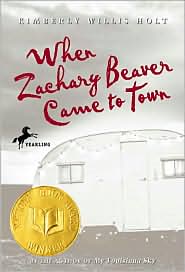 Holt is, arguably, best-known for her 1999 novel, When Zachary Beaver Came to Town (Henry Holt), winner of the National Book Award for Young People’s Literature. This is the story of a small Texas town, Antler, in the summer of 1971. Thirteen-year-old Toby and his best friend, Cal, meet the star of a sideshow act, 600-pound Zachary, the fattest boy in the world. Publishers Weekly called it a “heartwarming and carefully crafted novel” with a “message of tolerance . . . that contemporary readers will appreciate.” Deirdre Donahue at USA Today wrote, “{t}his book packs more emotional power than 90% of the so called grown-up novels taking up precious space on bookshelves around the country.” And in their starred review, the Horn Book wrote that, in her “down-to-earth, people-smart way, Holt offers a gift.” It’s been a long time since I’ve read it, but I remember how powerful the subject matter was and thinking that I hadn’t read a book that good in a long time.
Holt is, arguably, best-known for her 1999 novel, When Zachary Beaver Came to Town (Henry Holt), winner of the National Book Award for Young People’s Literature. This is the story of a small Texas town, Antler, in the summer of 1971. Thirteen-year-old Toby and his best friend, Cal, meet the star of a sideshow act, 600-pound Zachary, the fattest boy in the world. Publishers Weekly called it a “heartwarming and carefully crafted novel” with a “message of tolerance . . . that contemporary readers will appreciate.” Deirdre Donahue at USA Today wrote, “{t}his book packs more emotional power than 90% of the so called grown-up novels taking up precious space on bookshelves around the country.” And in their starred review, the Horn Book wrote that, in her “down-to-earth, people-smart way, Holt offers a gift.” It’s been a long time since I’ve read it, but I remember how powerful the subject matter was and thinking that I hadn’t read a book that good in a long time.
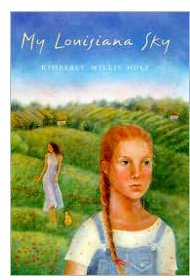
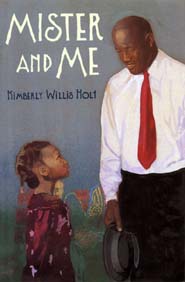 Even Holt’s literary debut was met with consistently good reviews: 1998’s lyrical My Louisiana Sky — what Publishers Weekly called “an unusually auspicious debut” — was adored by readers as well. It tells the story of twelve-year-old Tiger Ann, growing up in Saitter, Louisiana, in the 1950s, who struggles with her feelings about her stern — but loving — grandmother, her mentally slow parents, and her good friend and neighbor, Jesse. This was followed in the same year by Mister and Me (published by Putnam’s and with illustrations by Leonard Jenkins), a short novel which tells the story of the outspoken Jolene Jasmine Johnson, who lives in a small Louisiana mill town in 1940 and does not want her Momma to marry logger Leroy Redfield (a man “dark as a starless night, tall and thick as a long-leaf pine tree”). Leroy is courting Jolene’s widowed mother, and she makes every attempt to make Mister disappear. School Library Journal called the novel “touching,” and the Horn Book wrote, “Holt’s characters . . . introduce themselves as easily as neighbors proffering homemade buttermilk pie.”
Even Holt’s literary debut was met with consistently good reviews: 1998’s lyrical My Louisiana Sky — what Publishers Weekly called “an unusually auspicious debut” — was adored by readers as well. It tells the story of twelve-year-old Tiger Ann, growing up in Saitter, Louisiana, in the 1950s, who struggles with her feelings about her stern — but loving — grandmother, her mentally slow parents, and her good friend and neighbor, Jesse. This was followed in the same year by Mister and Me (published by Putnam’s and with illustrations by Leonard Jenkins), a short novel which tells the story of the outspoken Jolene Jasmine Johnson, who lives in a small Louisiana mill town in 1940 and does not want her Momma to marry logger Leroy Redfield (a man “dark as a starless night, tall and thick as a long-leaf pine tree”). Leroy is courting Jolene’s widowed mother, and she makes every attempt to make Mister disappear. School Library Journal called the novel “touching,” and the Horn Book wrote, “Holt’s characters . . . introduce themselves as easily as neighbors proffering homemade buttermilk pie.”
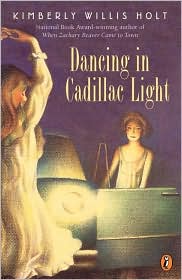
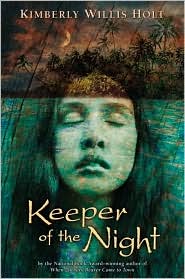 Finally, in between Zachary Beaver and Part of Me, Holt released two more critically-acclaimed titles: Dancing in Cadillac Light (Putnam’s, 2001) — a story set in Moon, Texas, in 1968 about eleven-year-old Jaynell, whose eccentric Grandpap comes to live with her family — and Keeper of the Night (Henry Holt, 2003). The latter was a bit of a departure for Holt. This was no story set in the past or in the South: Set on the island of Guam, it tells the story of thirteen-year-old Isabel and her family, who are trying to cope with the suicide of Isabel’s mother. School Library Journal wrote about Cadillac, “Holt once again displays her remarkable gift for creating endearingly eccentric characters as well as witty dialogue rich in dialect and idiom,” and about Keeper of the Night: “A beautifully written description of sorrow and recovery that should appeal to a wide audience.”
Finally, in between Zachary Beaver and Part of Me, Holt released two more critically-acclaimed titles: Dancing in Cadillac Light (Putnam’s, 2001) — a story set in Moon, Texas, in 1968 about eleven-year-old Jaynell, whose eccentric Grandpap comes to live with her family — and Keeper of the Night (Henry Holt, 2003). The latter was a bit of a departure for Holt. This was no story set in the past or in the South: Set on the island of Guam, it tells the story of thirteen-year-old Isabel and her family, who are trying to cope with the suicide of Isabel’s mother. School Library Journal wrote about Cadillac, “Holt once again displays her remarkable gift for creating endearingly eccentric characters as well as witty dialogue rich in dialect and idiom,” and about Keeper of the Night: “A beautifully written description of sorrow and recovery that should appeal to a wide audience.”
Holt has another picture book as well, released in June of this year by Henry Holt: Skinny Brown Dog with illustrations by Donald Saaf. I still haven’t managed to see this one yet — all about a baker who sees no need for a dog in his life yet ends up adopted by a stray — but I’m eager to. With Holt and Saaf behind the wheel, I have high hopes. Kirkus Reviews described it as a “tasty treat for reading aloud that should get a rave reception.”
Kimberly also visits schools to talk about the craft of writing. I once had the pleasure of seeing her speak at a middle school in which I was interning as a library student. She was gracious with the students, smart as hell, and really knew how to connect with them.
We are so pleased that Kimberly took the time to visit 7-Imp, and we thank her kindly. We’ll wipe the biscuit crumbs from our mouths now and sit down a spell and have a chat. Without further ado, here’s Ms. Holt . . .
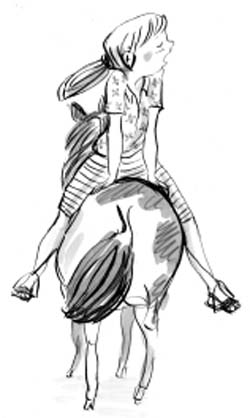 7-Imp: You are so good at writing about misfits. In what ways do you think Piper Reed is a misfit, if at all? {Illustrations pictured here and below from Piper Reed are done by Christine Davenier and used with permission from Henry Holt}.
7-Imp: You are so good at writing about misfits. In what ways do you think Piper Reed is a misfit, if at all? {Illustrations pictured here and below from Piper Reed are done by Christine Davenier and used with permission from Henry Holt}.
Kimberly: Most people would probably think of Piper as a misfit, except for Piper. She’s dyslexic, she’s often the new kid, and she’s the middle child. But one thing Piper has is a healthy self-esteem. She’s a planner. She sizes up situations and figures out the solution.
7-Imp: You’ve talked in interviews before about being a very shy child, not helped by the fact that your father was in the military and your family moved a lot. Was it, therefore, cathartic in some way to write about a protagonist -– the very spunky and mostly not-shy Piper Reed — who lives in similar circumstances? Did you take any of your own actual childhood experiences as a “navy brat,” by chance, and put them in the book?
Kimberly: Piper was inspired by my confident middle sister (who is not dyslexic). Alicia was funny and never met a stranger. I was jealous of her spunk. So it was fun to get inside her skin and see what the world would be like for someone who was fearless.
She should have been the writer, because she is such a great storyteller. The first day of her first grade, the teacher followed the bus to our home. My mother was horrified because she thought my sister had already gotten in trouble.
The teacher assured my mother that she did just fine that day. Then she added, “I’m just here to pick out one of your German shepherd puppies.” Alicia had told the teacher that our German shepherd had had twelve puppies.
We didn’t have a dog.
In Piper Reed: Navy Brat, Piper wants a German shepherd. The storyline seems to have nothing in common with what happened to my sister. But it does. It’s what inspired that storyline. It’s an example of how writers start with truth, but twist it until it becomes its own truth.
Aside from that incident, there are other moments in the book inspired by real details of my military childhood—driving across country to a new destination, visiting relatives that we saw only every couple of years, noticing the class distinctions on base, and being the new kid all the time.

7-Imp: So many of your books are about characters searching for their own definition of “home,” and so many of them are, in one form or another, about acceptance. I like how the circumstances of Piper Reed’s life are such fertile ground for these two themes. It seems, since her family has to move around so often and can’t seem to stay in one place, that she is learning to find “home” in her family, particularly her relationship with her sisters, no matter where they have physically landed. I just realized this and wish I had stated it more explicitly in my review! I don’t know that there’s a specific question in this; can you just generally respond to that idea?
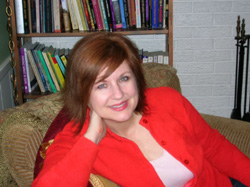 Kimberly (pictured here): You’re absolutely right. Geographically, I identify with several places as “home.” Forest Hill, Louisiana, will always be my emotional home because that’s where we always returned to—the land of my ancestors. I’ve lived in the Texas Panhandle for fourteen years. My husband and I raised our daughter here. It is not a place I would have chosen to call home, but one day recently I realized how much I love this place. It has become “home.”
Kimberly (pictured here): You’re absolutely right. Geographically, I identify with several places as “home.” Forest Hill, Louisiana, will always be my emotional home because that’s where we always returned to—the land of my ancestors. I’ve lived in the Texas Panhandle for fourteen years. My husband and I raised our daughter here. It is not a place I would have chosen to call home, but one day recently I realized how much I love this place. It has become “home.”
Having said all that, whenever I visit my parents there is a feeling of returning home even though they live in a place that I’ve never lived. I think military kids connect home with family, because we are not root-bound.
7-Imp: You received the National Book Award for When Zachary Beaver Came to Town, and Toby Wilson’s voice is entirely convincing. How did you get into the mind of a young, newly-teen boy when you started writing? Was it difficult at all?
Kimberly: This may sound strange, but it wasn’t difficult. Like all my main characters, Toby’s voice came to me and I just accepted it. Actually, my first published piece was a short story where the main character was a man.
Before When Zachary Beaver Came to Town was published, my dad read the manuscript. He said, “Now I can’t tell about those other books because those are about girls. But I’ve been a boy and this is how a boy thinks. How did you do that?” Compliments don’t come easily to my dad. You have to earn them. So you can imagine what his review of the story meant to me.
I don’t want to mislead you, though. I did ask my husband to read the manuscript to make sure Toby sounded like a boy. I remember one time he pointed out a place in the book and told me, “A boy wouldn’t say this. He’d say, ‘blood and guts.'” So when you reach that part in the story, thank Jerry for keeping it authentic.
 7-Imp: On that note, you received the award not very long (in the grand scheme of things) after first starting to write, correct? Can you tell us a bit about what it meant to you, at that point in your career, to have received such validation for your work (if that’s how you perceived it, that is)?
7-Imp: On that note, you received the award not very long (in the grand scheme of things) after first starting to write, correct? Can you tell us a bit about what it meant to you, at that point in your career, to have received such validation for your work (if that’s how you perceived it, that is)?
Kimberly: I was caught by surprise. I never in a million years would have thought I’d get that honor. I was thrilled to be nominated and would have been satisfied with that recognition alone. The morning of the awards ceremony I was at Henry Holt’s office and I told my editor, “I don’t think I’m going to get the award.” And my editor said, “I don’t think you are either.” The other nominees were great. We were both just happy that the book had been nominated. Of course, we were thrilled and surprised when it did win.
Receiving the award validated my writing—of that book. But each book that followed was a different story. I still had to rewrite to achieve the best book I was capable of writing. The award didn’t validate those books. If anything there was probably a greater expectation of my work after receiving the National Book Award. Most days it helps to forget that ever happened. And when I find myself reminiscing about that moment, it’s always followed with the sobering thought—Yeah, okay you got a big award, but are you any good now?
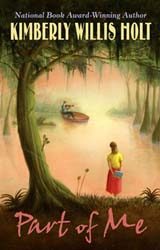 7-Imp: You have written books geared at a wide age range within the realm of children’s lit (picture books, YA, chapter books). What advice do you have for aspiring authors who wish to do the same? How different is the process of writing a chapter book compared to, say, a YA title? Did any part of it surprise you (when you first wrote Mister and Me and then Piper Reed)? And, for you as a writer, was it easier or harder for you to write the short stories of Part of Me, compared to the more unified narrative of a novel?
7-Imp: You have written books geared at a wide age range within the realm of children’s lit (picture books, YA, chapter books). What advice do you have for aspiring authors who wish to do the same? How different is the process of writing a chapter book compared to, say, a YA title? Did any part of it surprise you (when you first wrote Mister and Me and then Piper Reed)? And, for you as a writer, was it easier or harder for you to write the short stories of Part of Me, compared to the more unified narrative of a novel?
Kimberly: I love writing for a wide range of ages, but when I’m writing I’m not thinking about the age of the reader. I’m just writing the story that comes to me. I wouldn’t be happy if someone wanted to set limits for me. But the downside to writing picture books to YA (and everything in between) is that it’s harder to make a name for yourself than someone who writes for only one age group. I’m willing to take that risk. Otherwise, the joy would be missing from my work. I love getting up in the morning and writing stories. And that story may sometimes come in the form of a middle grade novel or a picture book. I like having a career that keeps challenging me.
Mister and Me came to me like a gift. It wasn’t a difficult book for me to write at all. I still had to rewrite, but the characters and the story were there from the beginning. Keeper of the Night was like that, too. That book took a lot of research though, including returning to Guam to find out more about the culture.
I love to read short stories more than novels, so I was excited about exploring that form in Part of Me. However, I ended up changing it to a novel made up of short stories because of my editor’s input. After reading it, she believed that it was both a short story collection and a novel. She suggested that I keep that framework in mind as I rewrote. I resisted at first. Then, as usual, her wisdom shines a light through my stubbornness. One day I realized she was right. It was Rose’s story and it was about how she was a part of all the people that came before her and after her. That meant going back and showing Rose in all the stories.
7-Imp: Did you purposefully set out to depart from Southern fiction, which you usually write and write so well, when you wrote the poignant Keeper of the Night, set in Guam and not in the past (the time frame for a lot of your other books), or did the story just beg to be told — or both?
Kimberly: My cousin, Kay, circles her finger at her temples and sings, “Do, do, do, do, do” when I mention hearing the voice of the character. But that’s what usually happens when I start writing a story. In this case, Isabel’s voice said, “My mother died praying on her knees.” I decided to follow that voice and instead of taking me to the deep South, it took me to an island. I love writing about the South and I’m not through exploring that, because even with all the moves, I consider myself a Southerner. But I’m a Southern writer who has lived around the world. I want to explore those experiences, too.
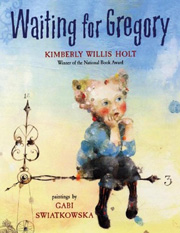 7-Imp: We are so curious to know what it must have been like for you the first time you saw Gabi Swiatkowska’s illustrations for your Waiting for Gregory text. Did you have any idea of the wonderfully surreal and whimsical direction she’d take the book with that art work? (The same question goes for Donald Saaf’s illustrations in Skinny Brown Dog, but I would think it would have been mind-blowing – in a good way – the first time you saw the direction Swiatkowska took the book in).
7-Imp: We are so curious to know what it must have been like for you the first time you saw Gabi Swiatkowska’s illustrations for your Waiting for Gregory text. Did you have any idea of the wonderfully surreal and whimsical direction she’d take the book with that art work? (The same question goes for Donald Saaf’s illustrations in Skinny Brown Dog, but I would think it would have been mind-blowing – in a good way – the first time you saw the direction Swiatkowska took the book in).
Kimberly: I am a big fan of Gabi’s work and was excited that she wanted to illustrate that book. The first picture I received was the illustration that was used for the copyright page—the one of the narrator, Iris. I thought she was gorgeous. It gave me a taste of what was to come, but I had no idea it would be set in a theatrical family. It took a moment to release my vision, but when I did, I realized what a very lucky writer I was. Gabi brought the book to a higher level. She created a world that didn’t exist in the text and the book is better because of that. That book taught me about picture book collaboration.
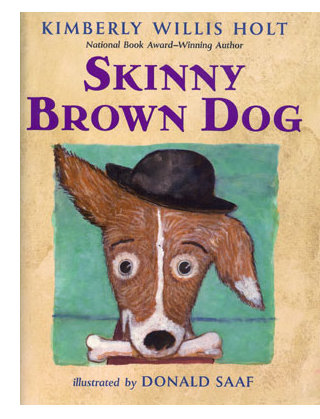 Though not in the same way, Donald Saaf’s illustrations surprised me, too. I wasn’t expecting all the characters to be animals, but I’m delighted that they are. And I think young children are, too.
Though not in the same way, Donald Saaf’s illustrations surprised me, too. I wasn’t expecting all the characters to be animals, but I’m delighted that they are. And I think young children are, too.
7-Imp: We love the “Writing Tips” portion of your web site. Can you tell us a bit about your writing process/”craft”? Do you outline plot before you write or just let your muse lead you on and see where you end up?
Kimberly: First sentences of my stories come to me, almost magically. That gives me the voice and the character. I usually know the beginning and the ending when I start a book. The journey toward that ending is discovered as I write. With the exception of the historical novel I recently sent in, I don’t outline. Before I write a scene, I web. I may know only one tiny thing about that scene, but webbing helps me flesh it out. I try to write my first drafts quickly. I write by hand on yellow legal pads. Those first drafts are rough and spare (usually half of the length they end up being once they are published.) I don’t fiddle with my story as I write that draft. I experimented this fall and tried to tinker as I put the manuscript into the computer each afternoon. It didn’t work. I’m convinced that writing first drafts quickly without revising is the key to getting books done. I still have to rewrite a lot, but at least I have my clay.
After I’ve finished a first draft, I let it get cold. Usually, I finish writing the first draft around the time my travel season begins so that forces me to have time away from the manuscript. When I return to the work, I see it with fresh eyes. Then it’s time to roll up my sleeves. When I was a new writer, I didn’t know how to rewrite. I wondered how I would ever make my work better. That’s when I came up with Whittle, Whittle, Whittle. I concentrate on one aspect of rewriting at a time. The second draft is about structure. It’s the only draft I dread. I’m not a natural plotter. Other drafts, I concentrate on sensory details, setting, dialogue, metaphors and similes, etc. There are drafts where I’ll concentrate on one character. I’ll follow their journey through the entire story and make sure they are developed. When I break down the components of good writing, the revision process doesn’t seem so overwhelming.
7-Imp: We know this question is considered cliché, but as book lovers, it interests us: What books and/or authors had an especially significant impact upon you as an early reader?
 Kimberly: As a young child, I loved Little Women and the Laura Ingalls Wilder books. In many ways, I related to the Ingalls girls. They moved a lot, too! The book that had the most significant impact on me was The Heart is a Lonely Hunter by Carson McCullers. It’s not my favorite book, but I love it. At twelve, I discovered the novel in my junior high library. When I read it, I longed to write realistic characters like her. My favorite book is To Kill a Mockingbird.
Kimberly: As a young child, I loved Little Women and the Laura Ingalls Wilder books. In many ways, I related to the Ingalls girls. They moved a lot, too! The book that had the most significant impact on me was The Heart is a Lonely Hunter by Carson McCullers. It’s not my favorite book, but I love it. At twelve, I discovered the novel in my junior high library. When I read it, I longed to write realistic characters like her. My favorite book is To Kill a Mockingbird.
7-Imp: Are you working on any new projects that you can tell us about? And is it true that Piper Reed will be a series of titles? If so, any tantalizing hints as to what Piper will be up to next?
Kimberly: It’s too soon to talk about the historical novel that I just turned in. I have some revising to do. But I can talk about the next Piper that is the second in the series. (There will be at least three Piper Reed books.) The Gypsy Club is going to have a pet show and Piper is trying to teach Bruna a few dog tricks. She’s not having much luck, but her new two-year-old neighbor seems to have the act down.
7-Imp: What’s one thing that most people don’t know about you?
Kimberly: I love pretty shoes and cowboy boots.
7-Imp: If you could have three (living) authors — whom you have not yet met — over for coffee or a glass of rich, red wine, whom would you choose?
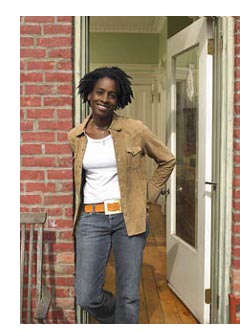 Kimberly: Anne Tyler, Jacqueline Woodson (pictured right), and Cynthia Rylant.
Kimberly: Anne Tyler, Jacqueline Woodson (pictured right), and Cynthia Rylant.
7-Imp: We like to ask people the wonderfully weird set of questions called The Pivot Questionnaire, since who knew that, say, asking someone what their favorite sound or noise is could tell you so much about them. So here goes:
What is your favorite word?
Kimberly: “Joy.”
7-Imp: What is your least favorite word?
Kimberly: “Hate.”
7-Imp: What turns you on creatively, spiritually or emotionally?
Kimberly: Home.
7-Imp: What turns you off?
Kimberly: When my office gets too messy.
7-Imp: What is your favorite curse word? (optional)
Kimberly: I’ll decline to answer, because my New Years Resolution is to eliminate those words from my vocabulary.
7-Imp: What sound or noise do you love?
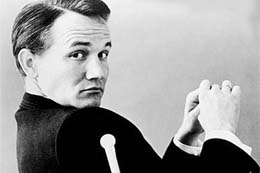 Kimberly: Almost any Roger Miller song. He was brilliant. I also love the sound of Yo-Yo Ma playing, too.
Kimberly: Almost any Roger Miller song. He was brilliant. I also love the sound of Yo-Yo Ma playing, too.
7-Imp: What sound or noise do you hate?
Kimberly: Fingernails scraping a blackboard.
7-Imp: What profession other than your own would you like to attempt?
Kimberly: A documentary filmmaker.
7-Imp: What profession would you not like to do?
Kimberly: Plumber.
7-Imp: If Heaven exists, what would you like to hear God say when you arrive at the Pearly Gates?
Kimberly: “Welcome. You are forgiven.”
For more online information about Kimberly Willis Holt (which I cannot promise is comprehensive, by any means, but it’s a start if you’re hankerin’ for more Holt):
- Holt’s web site
- Holt’s blog
- Interview at Viva La Feminista; December 19, 2007.
- Interview at The Karianna Spectrum; December 18, 2007.
- Interview at the blog of Kim Stagliano; December 18, 2007.
- Interview by Rhianna at A Texan Abroad; December 17, 2007.
- Interview at Through the Tollbooth; November 26, 2007.
- “Author Update: Kimberly Willis Holt,” an interview at Cynthia Leitich Smith’s Cynsations; September 17, 2005.
- Interview transcript from a book discussion with readers (students and teachers) of When Zachary Beaver Came to Town and Dancing in Cadillac Light at Scholastic; January 24 — February 11, 2005.
- “An Interview with 7 Readers Circle Authors,” which includes Ms. Holt, at Teenreads.com; 2003.
- Interview with Cynthia Leitich Smith at her site; 2002.
- “Small Town Girl,” interview by Kathleen T. Horning at School Library Journal; February 1, 2000.
- Transcript of an interview by Elizabeth Farnsworth at NewsHour with Jim Lehrer at pbs.org; November 22, 1999.
- Holt’s acceptance speech for receiving the 1999 National Book Award for Young People’s Literature for When Zachary Beaver Came to Town; The National Book Foundation; 1999.
- Biography and profile (in Holt’s own words) at Scholastic; Undated.
Ms. Holt has lined up other interviews this week for her blog tour at the following blogs (for the interviews that have already occurred this week on her blog tour, see the above resource list):
- Today, December 19, 2007
- All 4 My Gals
- Cynthia Leitich Smith’s Cynsations
- Viva La Feminista
- HomeMom3
- Offsprung
- Scribbly Katia
- XiaolinMama
Thursday, December 20
According to this post at Kimberly’s blog, some interview additions might happen along the way, so keep checking there for more information.

This is such a great interview. Piper Reed is getting serious airtime at our house. We picked it up at the Texas Book Festival this year and both girls read & loved it. Daughter #1 just finished it for the 2nd time. They’ll love to get a look at this interview afterschool today…
Great post and interview ladies! I really enjoyed getting to know more about her. And what a great website she has too!
I also want to thank you for the book give-away contest. I look forward to reading “Piper Read” autographed or not!
I thanked you and linked this post on my blog.
gail
http://gailmakiwilson.blogspot.com/2007/12/another-win.html
Thanks for the interview and opening my eyes to a new author! Great interview.
Thanks, you all. And you’re welcome, Gail. Happy to evangelize such good books. HipWriterMama, if she’s new to you, I really think you’ll enjoy her books.
Enjoyed this! Love that picture with her daddy. And the story about the teacher and the non-existent puppies. I have My Louisiana Sky here, courtesy of Kimberly’s generous blog giveaway, ready to read when I have a quiet moment.
Oh Sara, you’ll just love it, I bet.
[…] (Henry Holt, October 2010), which means that today I welcome author Kimberly Willis Holt (whom I once interviewed back in 2007, during the era in which images at 7-Imp were tragically small) and illustrator Laura […]
[…] Author Information Kimberly Willis Holt’s webpage. Interview with the author. […]